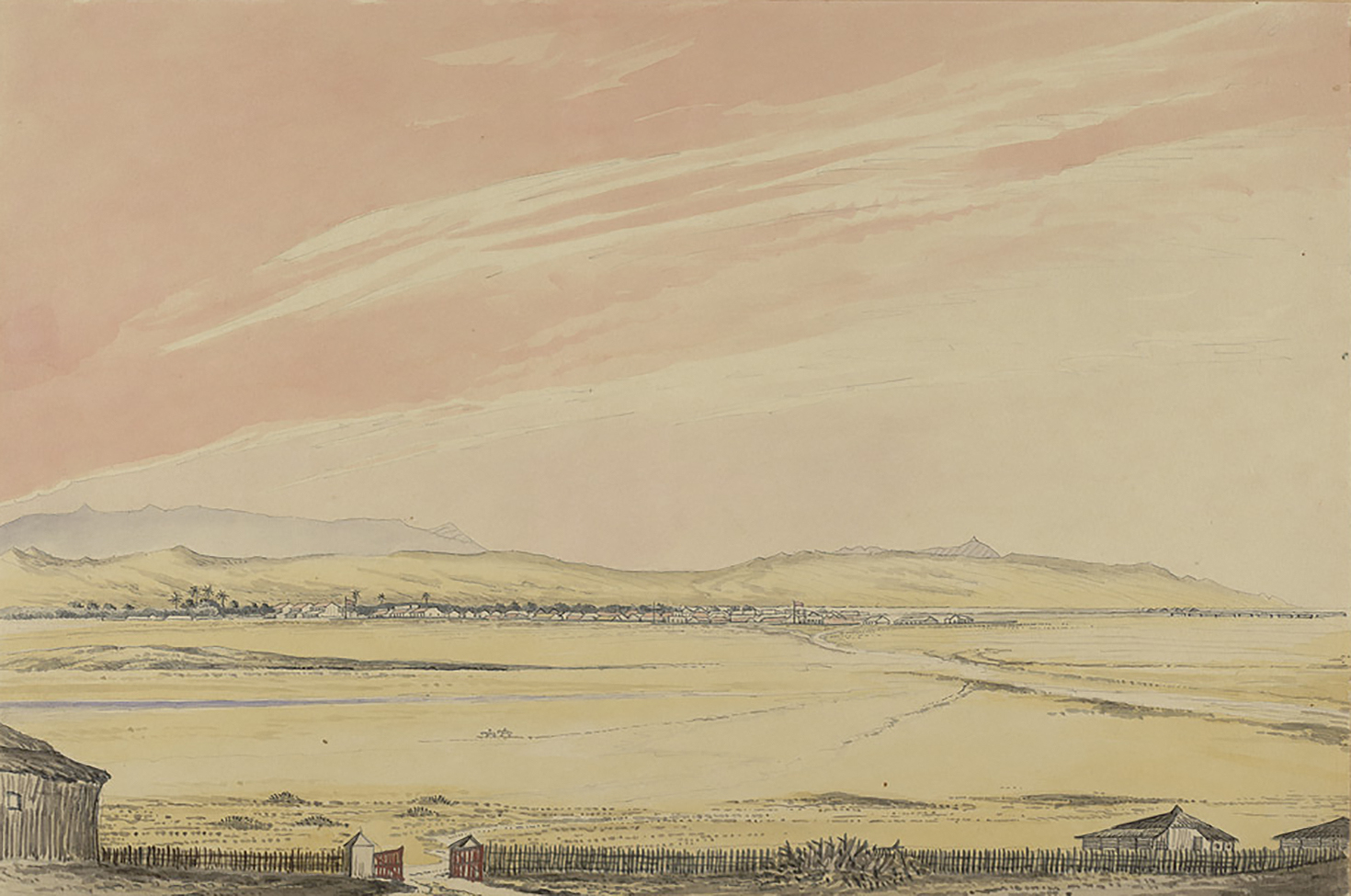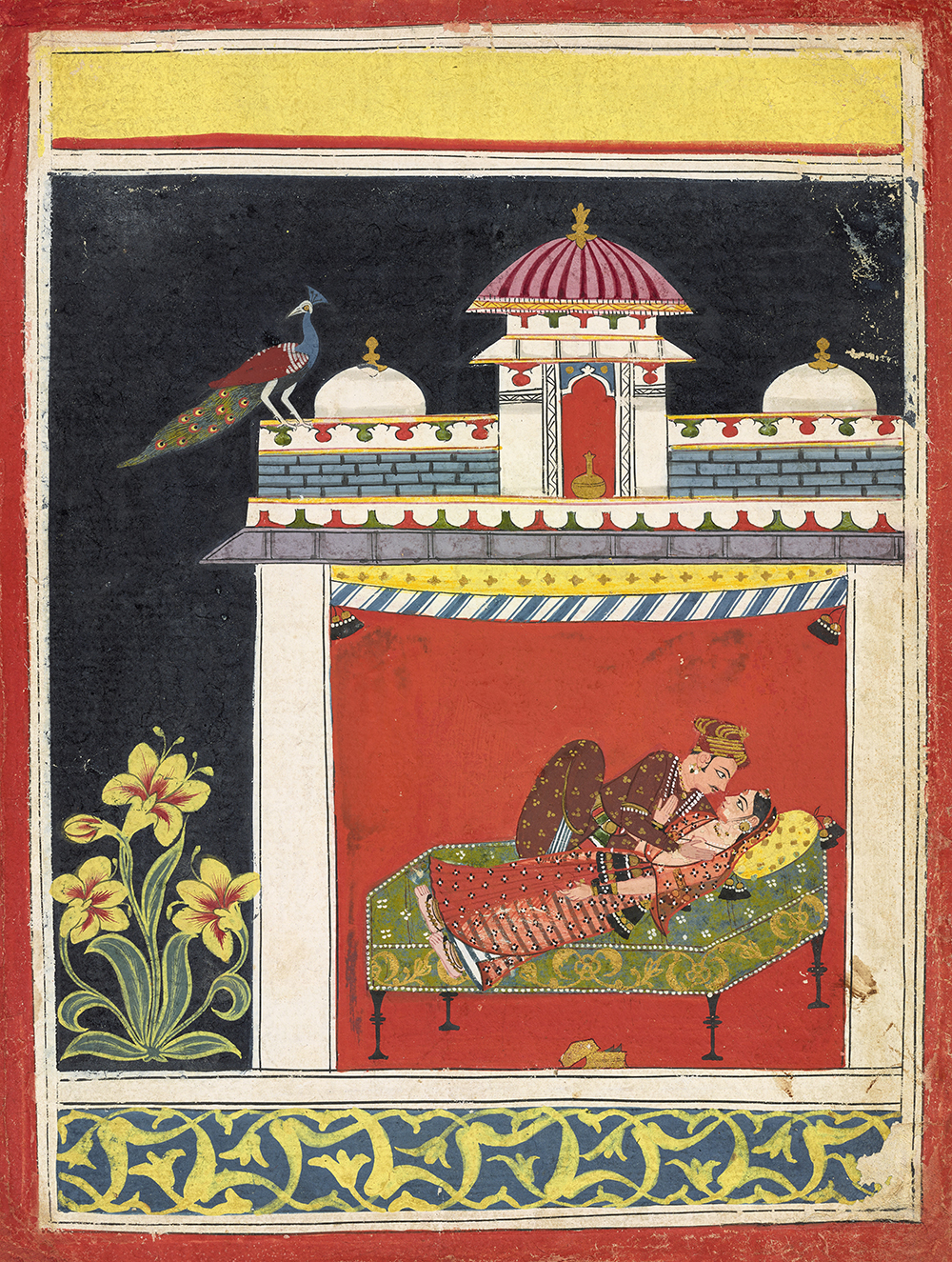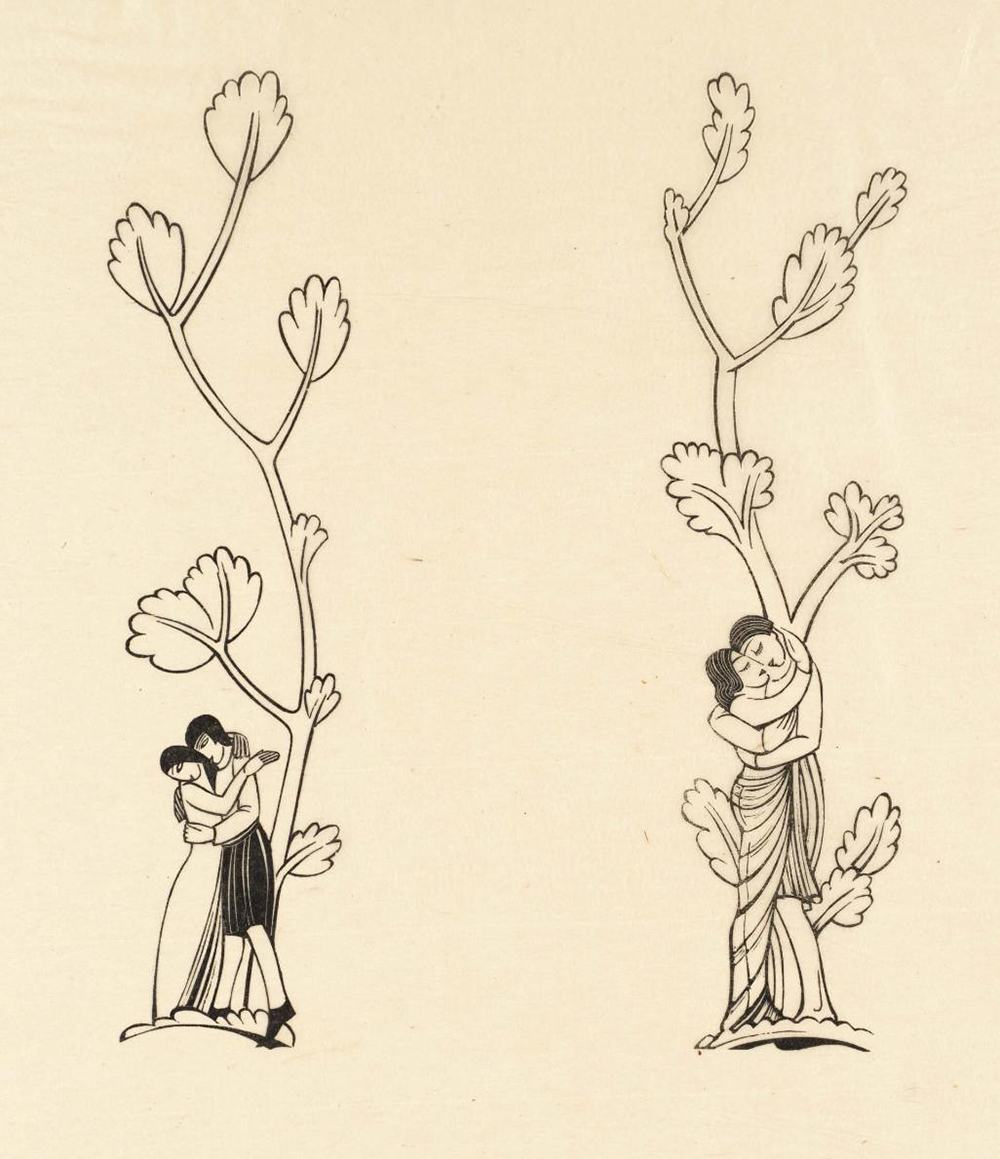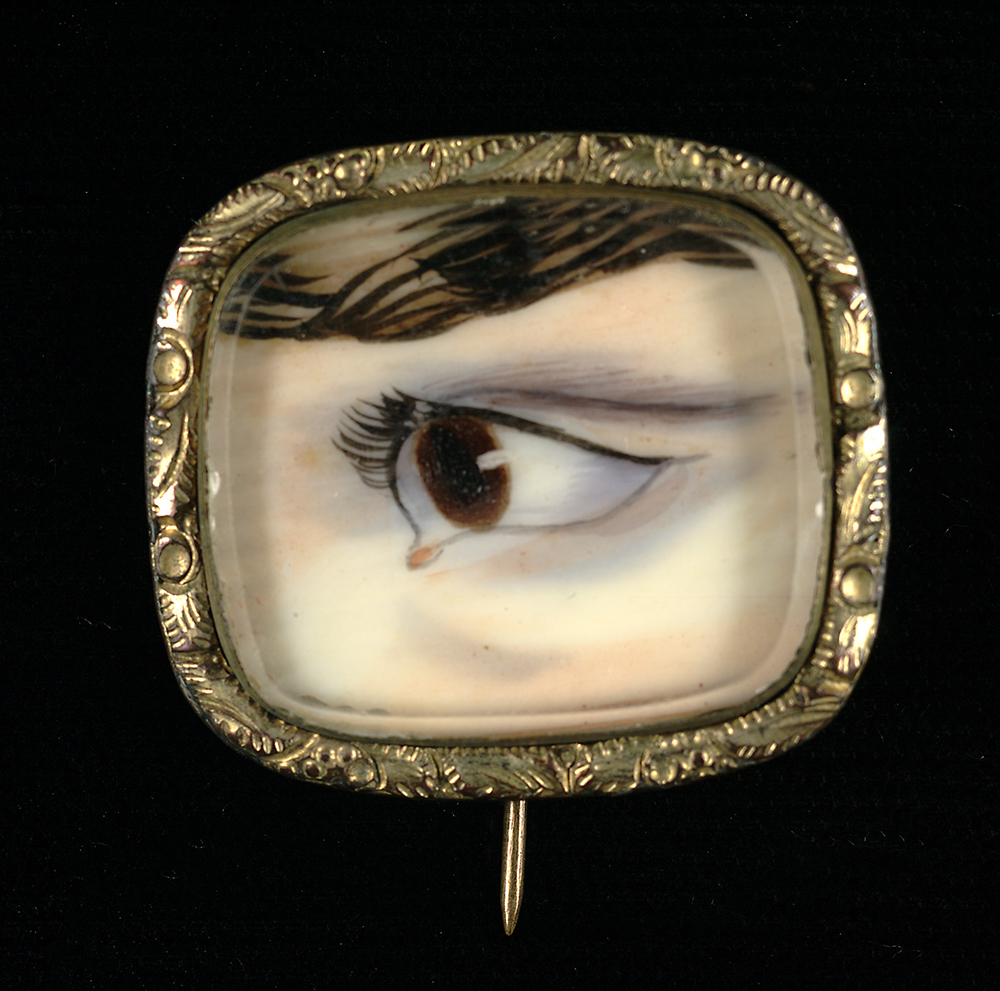
Northern view of the cantonment, Karachi, from the sea shore at Clifton, by Henry Francis Ainslie, 1851. British Library.
Lapham’s Quarterly is running a series on the history of best sellers, exploring the circumstances that might inspire thousands to gravitate toward the same book and revisiting well-loved works from the past that, due to a variety of circumstances, vanished from the conversation after they peaked on the charts. We are also publishing a digital edition of one of these forgotten best sellers, Mary Augusta Ward’s 1903 novel Lady Rose’s Daughter, with a new introduction, annotations, and an appendix. To read more about the project and explore the other entries in the series, click here.
The existence of a best-selling book means that a lucky coincidence has occurred, a meeting of author and audience that translates into sales. If such a convening occurred for any collection including Saadat Hasan Manto’s short story “Bu” (Odor), it was never recorded. Instead the story remains famous for being banned. After “Bu” was first published in the Urdu literary journal Adab-e-Latif in 1944, the thirty-two-year-old Manto, an itinerant writer then living in Bombay (now Mumbai), was charged with obscenity by the British. The colonial authorities’ move would bolster a tradition of literary bans—and fears that complicated the magical connection between authors and their ideal audiences—that would persist long after they left. And the story circulated via the underground Urdu-literature circuit in British India.
But that would come later. At the time, the India that the British were holding on to was one in tumult. The British authorities were understaffed, owing to the war effort, which made them feel particularly vulnerable to suspected seditions of the natives they ruled. All this formed the backdrop for the obscenity charges filed against Manto. In no more than four thousand words, “Bu” told the tale of Randhir, a bored young man wasting the evening in his Bombay flat. On other nights, he might have met up with his Christian lover Hazel, who lives on a floor below his. But after joining the Women’s Auxiliary Corps of the British Indian army, she had more time for the cantonment and the white men who live there and less for Randhir, who was left to stew in self-pity on his apartment’s balcony. From his perch he sees a dark young tribal woman taking shelter under a tree. He is attracted to her and invites her up to the apartment.
The ensuing erotic encounter between Randhir and the nameless woman is sensuously rendered. After the two have sex, Randhir finds himself surprised by his attraction to the scent of this poor, dark-skinned woman. It is an odor that is pleasing and displeasing at the same time, earthy and unsettling. The story ends with a twin scene: Randhir is again sitting at the edge of a bed, but now the woman sitting next to him is his bride. She is the “appropriate” sexual partner for Randhir: a magistrate’s daughter who is “white-skinned,” the ultimate standard for female beauty at the time. Yet Randhir yearns for the nameless woman from the rainy night; his new bride “fails to rekindle his masculine interest.”

This brief story annoyed the War Department of the British Indian army. Clues to what happened next have recently been unearthed by a researcher named Sarah Waheed. According to memos on Manto that Waheed found among the colonial records left behind in India, the story was intolerable because of its references to the Women’s Auxiliary Corps. In one memo, a General Wade notes that “the story is certainly most detrimental to recruiting insofar as it suggests that association in the WAC may be those of prostitutes and we wish to press for prosecution.” Other military officials seem to echo the feeling, based on a roughshod translation of the story from Urdu to English that is also in the file. Waheed found this unsigned translation to be littered with grammatical mistakes and ultimately a deadened version of the original Urdu story.
Of course, nothing stings if it doesn’t meander close to the truth. The WAC prospects whose recruitment these officials so wished to protect were essential to the British war strategy. Both white and Indian women in the WAC assisted the ongoing war effort at a time when British were short of personnel. Indian women joining the organization in assisting with the British “war effort” were forsaking the anticolonial effort to drive the British out of India. The allusion to prostitution doubles the offense: Hazel, the ex-girlfriend, the story implies, is betraying both Randhir and her country.
There was also a more literal meaning. Prostitution laws were one of the first ways the British extended control over Indians. The British passed expansive legislation in the 1860s that essentially categorized all women who did not belong in upper-caste Hindu monogamous marriages as “prostitutes.” As historian Durba Mitra writes, “Through an elaborate system of categorization that tied social behavior with crime, the colonial state consistently saw women outside the conjugal home as sexually promiscuous, often naming them prostitutes” simply because, in the British view, the monogamous marriage was the “sole space of legitimate sexual behavior.” Laws establishing cantonments in certain parts of the city attempted to keep the women who consorted with white British soldiers away from the women who would be sexually available to native men.
It is amusing, then, to consider the British army’s argument that Manto was hindering its attempt to win the support of Indian women by redeploying the expansive definition of prostitute created by the British against the British. Both the definitions of prostitution and the prohibition of obscene words or acts that led to Manto’s trial came from the same Indian Penal Code put into place by British authorities—the former was covered in the code’s 1868 Contagious Diseases Act, the latter was included in the penal code’s original 1860 iteration. Section 292(a), under which Manto was tried, criminalizes the sale or distribution of any book that was “obscene.” Obscene is never defined, allowing a British judge the discretion to convict as he pleased. Similar charges were also filed against other authors who belonged to the burgeoning Progressive Writers’ Movement, the anti-imperialist group founded in Lucknow in 1936 that sought to promote Urdu literature. The Movement was made up of a number of avant-garde writers and poets who sought to take Urdu literature into the modern era by exploring issues around sex, sexuality eroticism, and other taboo topics. Sexual content seemed to be the usual pretext for dragging them to court under obscenity charges. Not long after Manto’s trial, feminist author Ismat Chughtai was tried for her story “Lihaaf” (Quilt), which featured the sexual awakening of an aristocratic women at the hands of her masseuse.
Manto was eventually convicted, although he was acquitted during an appeal—as he was after all of his obscenity trials. Those who have searched for “original” copies of “Bu” have found their efforts frustrated, either because those who would have had them are now dead or because the obscenity charges meant that the copies were not saved in the archives of the major universities on the Indian subcontinent.

The fact that a law with such a hazy definition of obscenity could be targeted at a story in which every word was carefully chosen grated on Manto. He wrote in an essay a few years later, “God alone knows why the prosecution describes a short story as obscene when it is not even remotely so—if I want to mention a woman’s breasts then I will call them a woman’s breasts—a woman’s breasts can’t be called peanuts, or a table or a shaving razor—though it has to be said that for some people the very existence of women is an obscenity, but what to do of that.” Manto was being sarcastic: he knew the real objection to his short story was, as it would be in the case of D.H. Lawrence’s trial for obscenity for Lady Chatterley’s Lover nearly two decades later, the expression of women’s sexuality. It is not possible to discern from our position today which provocation—the sexuality of the tribal woman, the attractions of the cantonment, or just the upending of class suggested by sex between a rich man and a poor woman—that was foremost for Manto. Like any masterful short story author, he did not leave many clues. His readers at the time likely enjoyed the multiplicity of provocations.
Nearly eighty years later, Manto’s international legacy seems secure, at least for the moment. He was memorialized in a Google Doodle and two movies, one Pakistani and one Indian. The Guardian named him the best Pakistani novelist in 2017. The following year the BBC counted Manto’s 1955 short story “Toba Tek Singh” as number 100 of the top 100 stories that shaped the world. Manto is remembered as the greatest prose stylist in Urdu, and his books (now with better English translations) are in print widely, making “Bu” available to the world for the first time along with many of his other works, including “Letters to Uncle Sam,” which included his thoughts on a 1950 obscenity trial in the U.S., in which a judge upheld novelist Erskine Caldwell’s right to publish the sexually frank God’s Little Acre: “My judge thought that truth and literature should be kept far apart. Everyone has his opinion.” Manto, who died at the age of forty-two in 1955, did not get the chance to watch “Bu” and his other stories find these new audiences. During his lifetime, “Bu” was largely accessible only to British government officials, the same ones who had made the story inaccessible to the Urdu readers Manto had hoped to reach.
At home, the legacy of Manto’s court case seems as secure as the author’s literary celebrity around the world. The British moved on after the 1947 Partition, but they left behind a tool kit for the newborn states of India and Pakistan to enact oppressions of their own. The Indian Penal Code of 1860 included, for instance, blasphemy laws that made it a crime to insult another’s religion. The intent at the time was to foster a spirit of racial harmony, an irony given the British penchant to divide and rule. The laws were expanded in the 1920s when communal riots between Hindus and Muslims revealed the absence of accord. In Pakistan, those original blasphemy laws were included in the new Pakistan Penal Code and have since become a machine to deploy death sentences against clerics, literary figures, professors, and also just the unknown and unfortunate. Before his death, Manto moved to the newly created Pakistan, where he was tried for obscenity three separate times for three other stories.
The resurrected and indigenized Indian Penal Code of 1860 resurfaced in 1989 as a crucial prop in a literary legal drama. The law that criminalized “obscene books” also criminalized blasphemy, becoming the precursor to the laws under which another author was deemed a blasphemer and his book blasphemous.
Growing up in Pakistan in the 1990s, I was acutely aware of a book called The Satanic Verses. Salman Rushdie’s 1988 novel was a best seller in the West but mostly inaccessible to readers in South Asia, its author branded a “blasphemer” for his derogatory portrayal of the Prophet Muhammad. The book was banned by the governments of Pakistan, Bangladesh, India, and other countries around the world, and Iran’s Ayatollah Khomeini issued a fatwa calling for Rushdie’s death. Because The Satanic Verses existed only by reputation and hearsay in these countries, the book was a shadowy blank slate to me, known for being bad but with no one saying exactly why. Working off its devilish title, my childish imagination came to the conclusion that people who wrote books could well be Satan. The idea that such a book was a best seller in other countries was baffling. Why would they like such a book, such a satanic author?
Rushdie is a devotee of his literary ancestor Manto; both grew up in Bombay, both belonged to the Muslim bourgeoisie, and both chose exile from the city they loved, one to Lahore in Pakistan and the other to London. In retrospect, Rushdie recognized something Manto could not see from his moment in time. The obscenity laws, the blasphemy laws, the religious divides that the British were leaving behind would not make the subcontinent a hospitable place for writers. The British legacy included an extremely narrow definition of the permissible, one that could seemingly be escaped if one continued writing about the country from outside it. The Britishness of this legal weapon—obvious in the case of Manto—often goes unmentioned in Western discussions of Rushdie even though nearly every consumer of literature in Pakistan would be aware of it.
The Satanic Verses sold enough copies to qualify as a best seller, but here, too, there were complications. The book, redolent as it is with themes from Islamic history and practice, has never reached the Muslim audience that would be familiar enough with the context to truly decode the book’s meanings. The Western reader may read the book and revel in its most obvious aspersions, lamenting and condescending all the while to Muslim sensitivities, but it is impossible for them to go beyond this. The ultimate meaning of a book or story lies, after all, in that catalytic reaction between text and reader; without the right readers, books may still become best sellers, but they are never truly realized. It is no surprise, then, that Rushdie remains, as academic Sadiq Jalal al-Azm pointed out, profoundly obsessed with the fates of his native India and Pakistan, representing as they do the audience he wrote for. It is entirely possible, therefore, to argue that his best work was directed to people he had left behind, who still do not often read his work.

Writers from South Asia, particularly those from Pakistan, are still suspended in these tragedies. The burden of colonial legacies, of a world divided into the obscene and the pure and the sacred and the blasphemous, still remains.
In the post-Manto decades, Urdu writing has languished. Many Urdu authors chose the banal and the formulaic over the provocative and possibly obscene—an act of pragmatic self-censorship. Those writing in English had to accept the reality that the only way to write and earn some modicum of a living at it is to aim (like Rushdie did) for foreign shores with foreign audiences who now enjoy the very provocative international writing even as they forget that it was their colonial forebears who made it impossible to sell such literature locally. Writing in English suffers from its own ailments; according to booksellers in Pakistan, few local presses publish English books and their circulation is extremely limited. Most of the publishing market is dominated by textbooks, and few metrics regarding the number of books published and sold are available. Whether this is a product or consequence of the shadow of the blasphemy laws is an ontological question, inherently circuitous.
At the present moment, Pakistani publishing is in a shambles. The large international corporations such as HarperCollins and Penguin Random House have affiliates in India that permit them access to that consumer market. While these conglomerates are interested in selling books to Pakistani audiences, they have shown less interest in cultivating Pakistani writers and commissioning books that are geared toward a Pakistani audience. In recent years, many writers have had to turn to self-publishing. Some of these authors have gone beyond their own work to establish small presses and public-relations outfits that cater to writers. They offer some hope for the future but only the very dimmest kind.
Fewer books speak to Pakistanis themselves. Literary culture lies decayed and stagnant save for small literary festivals in which the usual people clap for the usual authors. The Pakistani writer has been made into an eternal literary refugee, cobbling together audiences from this or that diaspora in the hope that they may add up to a whole or even a best seller, offering up sales numbers to make up for being misunderstood.